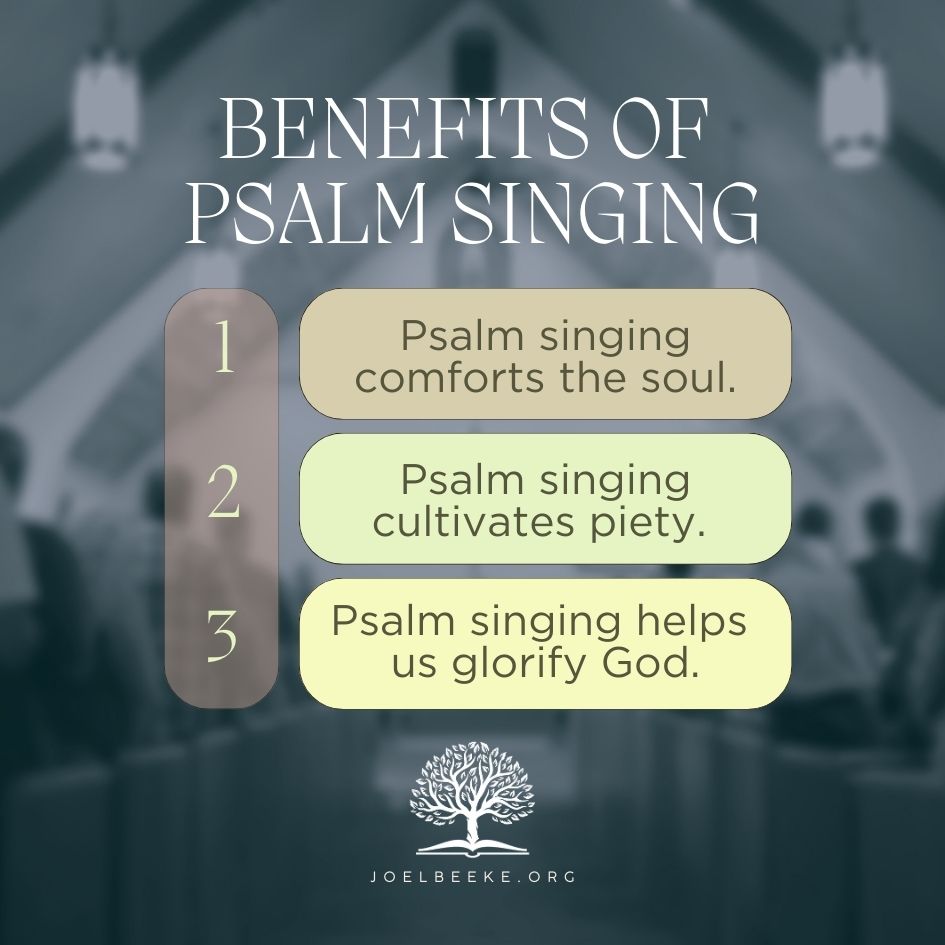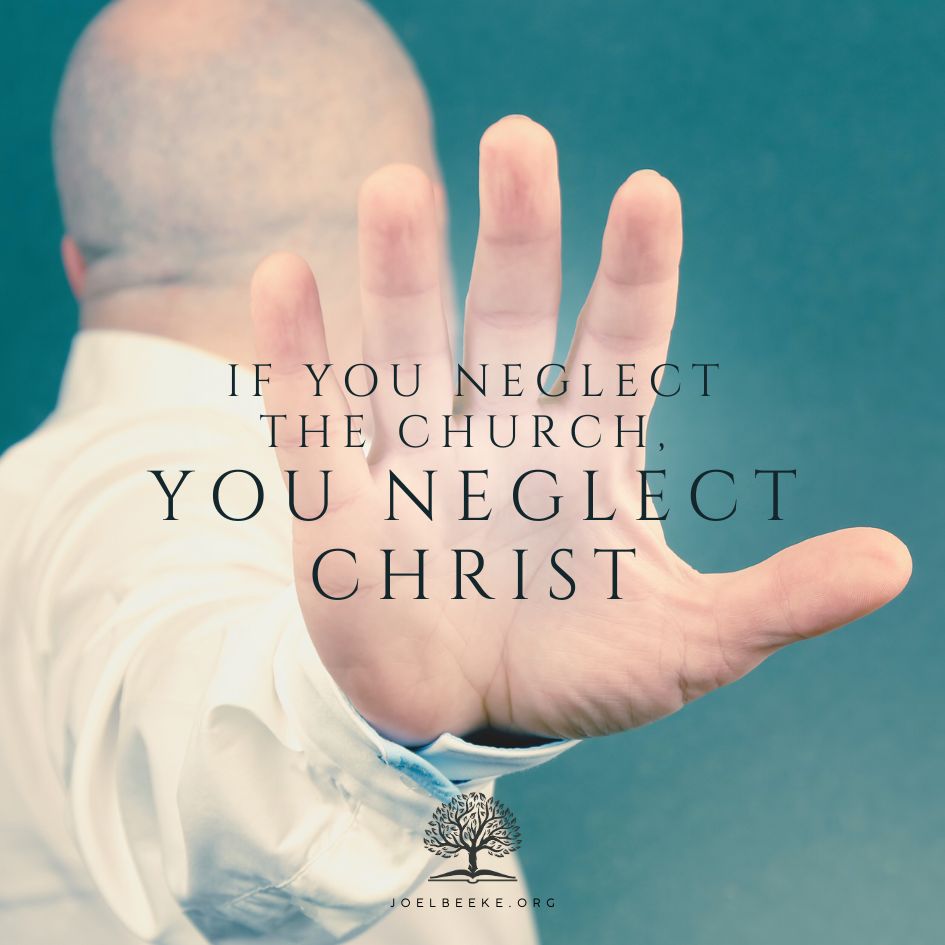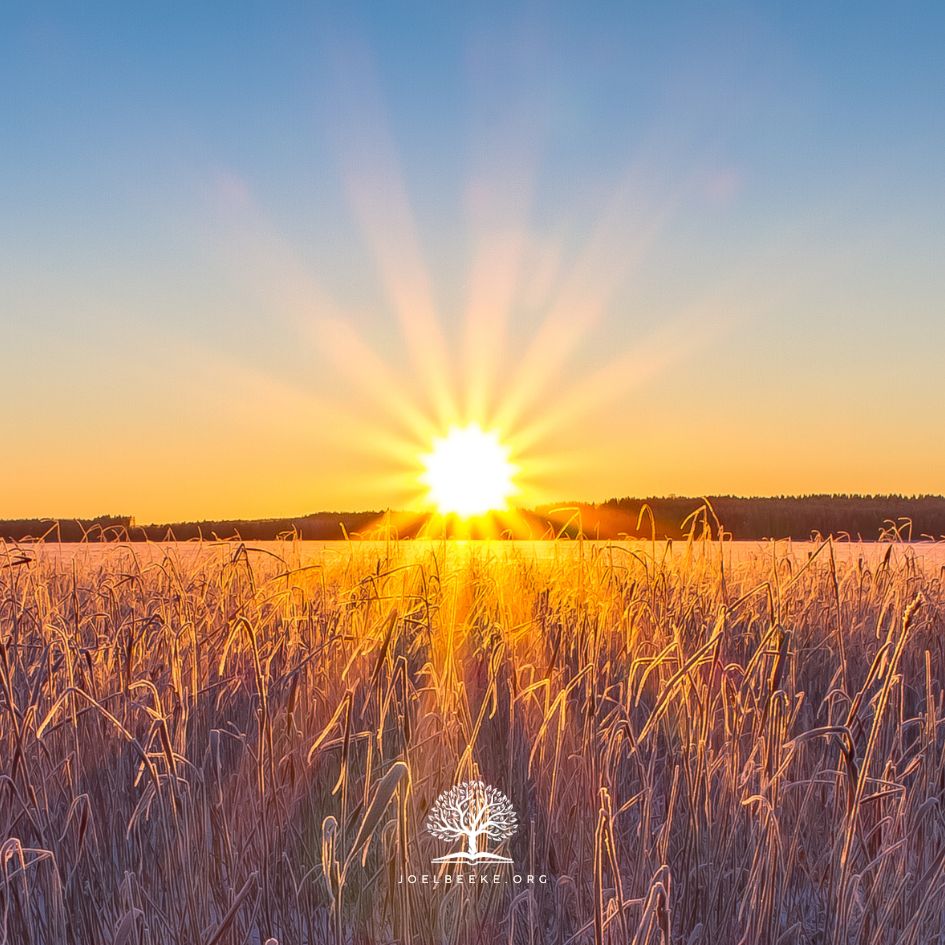Resources
Psalm singing helps us glorify God, as the Reformation and post-Reformation divines tell us repeatedly. Joel Beeke

Albert Bailey rightly concludes that Calvin’s theological beliefs about the Psalter helped unite the Reformers and Puritans around the conviction that “only God’s own Word was worthy to be used in praising Him.”1Albert Bailey, The Gospel in Hymns: Backgrounds and Interpretations (New York: Charles Scribner’s Sons, 1950), 17. Psalm singing was important to Calvin and the Puritans, however, not only because it is biblical and historical and is our theological and moral duty to God, but also because of the gracious effects it has upon those who sing. Here are some spiritual and practical benefits of psalm singing:
- Psalm singing comforts the soul. It lifts up the spiritually downcast and provides spiritual riches that are Christ-centered and experiential. Cotton says psalm singing “allayeth the passions of melancholy and choler, yea and scattereth the furious temptations of evill spirits, 1 Sam. 16.23.”2Singing of Psalmes, 4. It “helpeth to ass[u]age enmity, and to restore friendship favour, as in Saul to David.”3Ibid., 4. Increase Mather observes “that musick is of great efficacy against melancholy.” Mather says, “The sweetness and delightfulness of musick has a natural power to [overcome] melancholy passions.”4Increase Mather, A History of God’s Remarkable Providences in Colonial New England (1856; reprint, Portland, Ore.: Back Home Industries, 1997), 187. For Calvin and the Puritans, a psalter is what Robert Sanderson (1587–1662) called “the treasury of Christian comfort.”5Cited in Rowland E. Prothero, The Psalms in Human Life (1903; reprint, Birmingham. Ala.: Solid Ground Christian Books, 2002), 176. Sanderson, Bishop of Lincoln, ejected from his professorship at Oxford and imprisoned by Parliament, found great comfort through difficult times in the Psalter. Subsequently, he wrote that a psalter is “fitted for all persons and all necessities; able to raise the soul from dejection by the frequent mention of God’s mercies to repentant sinners: to stir up holy desire; to increase joy; to moderate sorrow; to nourish hope, and teach us patience, by waiting God’s leisure; to beget a trust in the mercy, power, and providence of our Creator; and to cause a resignation of ourselves to his will: and then, and not till then, to believe ourselves happy.”6 Cited in ibid.
- Psalm singing cultivates piety. Lewis Bayly included a section on psalm singing in The Practice of Pietie. He set down five rules for psalm singing:
-
- Beware of singing divine Psalmes for an ordinary recreation; as do men of impure Spirits, who sing holy Psalmes, intermingled with prophane Ballads. They are Gods Word, take them not in thy mouth in vaine.
- Remember to sing Davids Psalmes, with Davids Spirit.
- Practice Saint Pauls rule: I will sing with the Spirit, but I will sing with the understanding also.
- As you sing, uncover your heads, and behave your selves in comely reverence, as in the sight of God, singing to God, in Gods owne Words: but bee sure that the matter makes more melody in your hearts, than the Musicke in your Eares: for the singing with a grace in our hearts, is that which the Lord is delighted withal…
- Thou maist, if thou thinke good, sing all the Psalmes over in order: for all are most divine and comfortable. But if thou wilt chuse some speciall Psalmes, as more fit for some times, and purposes: and such, as by the oft-usage, thy people may the easilier commit to memory.7Lewis Bayly, The Practice of Pietie (London: Printed by R. Y. for Andrew Crooke, 1638), 233–34.
- Finally, psalm singing helps us glorify God, as the Reformation and post-Reformation divines tell us repeatedly. Calvin wrote, “Truly, we know through experience that [psalm singing] has great force and vigor to move and enflame hearts to invoke and to praise God with a more lively and ardent zeal.” Calvin goes on to say, quoting Augustine: “When we sing these psalms…we are certain that God puts the words into our mouths as if he were singing in us to exalt his glory.”8Miller, “Calvin’s Understanding of Psalm-Singing as a Means of Grace,” 38, 40.. Wilhelmus à Brakel, a primary Dutch Further Reformation divine of Puritan mind, agrees: “Singing [psalms] is a religious exercise by which, with the appropriate modulation of the voice, we worship, thank, and praise God.”9Wilhelmus á Brakel, The Christian’s Reasonable Service, trans. Bartel Elshout, ed. Joel R. Beeke (Morgan, Pa.: Soli Deo Gloria Publications, 1995), 4:31. Therefore, let those who sing psalms, sing for the praise of God! “Sing praises to God, sing praises: sing praises unto our King, sing praises. For God is the King of all the earth: sing ye praises with understanding” (Ps. 47:6–7).
Excerpt From
Sing a New Song
Joel R. Beeke







